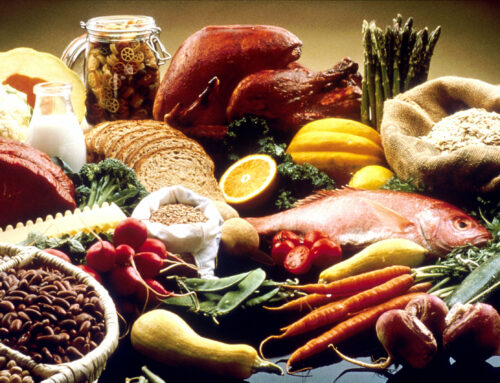Diet & Weight Loss
So you want to lose weight and get in shape? Here are some of the most popular diets:
Mediterranean Diet
The Mediterranean Diet is inspired by the traditional eating habits of people living in countries bordering the Mediterranean Sea. It is not a strict diet but rather a way of eating that emphasizes whole foods, especially fruits, vegetables, whole grains, legumes, nuts, seeds, olive oil, and herbs and spices. Here’s how it works:
- Emphasis on plant-based foods: The Mediterranean Diet is centered around plant-based foods like fruits, vegetables, whole grains, legumes, nuts, and seeds. These foods are high in fiber, vitamins, minerals, and antioxidants.
- Healthy fats: Olive oil is the primary source of fat in the Mediterranean Diet. It is high in monounsaturated fats, which are heart-healthy fats that can help reduce inflammation and improve cholesterol levels.
- Moderate fish and poultry: Fish and poultry are consumed in moderate amounts in the Mediterranean Diet. Fish, especially fatty fish like salmon, mackerel, and sardines, are rich in omega-3 fatty acids, which are beneficial for heart health.
- Limited red meat: Red meat is consumed in small amounts in the Mediterranean Diet. It is often replaced with plant-based protein sources like legumes and nuts.
- Red wine in moderation: Red wine is consumed in moderation with meals in the Mediterranean Diet. It is rich in antioxidants and may have heart-healthy benefits when consumed in moderation.
- Herbs and spices: Herbs and spices are used to flavor foods instead of salt, which can help reduce sodium intake.
- Regular physical activity: The Mediterranean lifestyle also includes regular physical activity, which is important for overall health and well-being.
Overall, the Mediterranean Diet is not just about the foods you eat but also about the lifestyle choices you make. It has been associated with numerous health benefits, including reduced risk of heart disease, stroke, cancer, and diabetes.
Ketogenic Diet
The ketogenic diet, often referred to as the keto diet, is a high-fat, low-carbohydrate eating plan designed to induce a state of ketosis in the body. Ketosis is a metabolic state where the body primarily burns fat for fuel instead of carbohydrates. Here’s how the ketogenic diet works:
- Low carbohydrate intake: The ketogenic diet restricts carbohydrate intake to a very low level, typically around 20-50 grams per day. This forces the body to use alternative fuel sources, namely fat, for energy.
- High fat intake: The diet emphasizes consuming high amounts of healthy fats, such as those found in avocados, nuts, seeds, olive oil, and fatty fish. Fat becomes the primary source of calories in the absence of carbohydrates.
- Moderate protein intake: Protein intake is moderate on the ketogenic diet, typically around 20-25% of total calories. Consuming too much protein can potentially interfere with ketosis, as excess protein can be converted into glucose through a process called gluconeogenesis.
- Production of ketones: When carbohydrate intake is restricted, the liver begins to produce ketone bodies from fat. These ketones serve as an alternative fuel source for the brain and other tissues, allowing the body to function in the absence of carbohydrates.
- Achieving ketosis: By drastically reducing carbohydrate intake and increasing fat intake, the body eventually enters a state of ketosis, where ketone levels in the blood rise significantly. This metabolic state is associated with numerous health benefits, including weight loss, improved blood sugar control, and increased mental clarity for some individuals.
- Potential side effects: Some people may experience side effects when first starting the ketogenic diet, often referred to as the “keto flu.” These symptoms may include fatigue, headaches, nausea, dizziness, and irritability. However, they typically subside within a few days to a week as the body adjusts to using ketones for fuel.
It’s important to note that the ketogenic diet is not suitable for everyone and should be approached with caution, especially for those with certain medical conditions or individuals who are pregnant or breastfeeding. Consulting with a healthcare professional before starting any new diet is recommended.
Paleo Diet
The Paleo Diet, short for Paleolithic Diet, is based on the idea of eating foods that were available to our hunter-gatherer ancestors during the Paleolithic era. The diet emphasizes whole foods such as lean meats, fish, fruits, vegetables, nuts, and seeds, while excluding processed foods, grains, legumes, dairy products, and refined sugars. Here’s how the Paleo Diet works:
- Focus on whole foods: The Paleo Diet encourages the consumption of whole, unprocessed foods such as meats, fish, fruits, vegetables, nuts, and seeds. These foods are nutrient-dense and provide a wide range of vitamins, minerals, and antioxidants.
- Elimination of processed foods: Processed foods, including refined sugars, grains, and vegetable oils, are not allowed on the Paleo Diet. These foods are often high in unhealthy fats, sugars, and additives.
- Exclusion of grains and legumes: Grains and legumes are not included in the Paleo Diet because they were not consumed by our Paleolithic ancestors. This means no wheat, oats, rice, or beans.
- Focus on healthy fats: While the Paleo Diet restricts certain fats like those found in processed foods, it encourages the consumption of healthy fats such as those found in avocados, nuts, seeds, and olive oil.
- Increased protein intake: The Paleo Diet is typically higher in protein compared to a standard diet, as it includes plenty of meat, fish, and eggs.
- Benefits: Proponents of the Paleo Diet claim that it can lead to weight loss, improved blood sugar control, and better overall health due to its focus on whole, nutrient-dense foods and elimination of processed foods.
It’s important to note that the Paleo Diet is a lifestyle choice rather than a temporary weight loss plan. As with any diet, individual results may vary, and it’s advisable to consult with a healthcare professional before making significant changes to your diet.
Intermittent Fasting
Intermittent fasting (IF) is an eating pattern that cycles between periods of fasting and eating. There are several different methods of intermittent fasting, but the most common ones involve fasting for 16-24 hours, one or two days per week, or restricting calorie intake to 500-600 calories on two non-consecutive days of the week. Here’s how intermittent fasting works for weight loss:
- Calorie restriction: Intermittent fasting can lead to weight loss primarily through calorie restriction. By limiting the time window in which you eat, you naturally consume fewer calories, which can result in weight loss over time.
- Increased fat burning: During fasting periods, your body’s insulin levels drop, signaling your body to start burning stored fat for energy. This can lead to increased fat burning and potentially greater weight loss compared to traditional calorie restriction diets.
- Improved metabolic health: Intermittent fasting has been shown to improve various metabolic markers, such as insulin sensitivity and blood sugar levels, which can help with weight loss and overall health.
- Appetite regulation: Some studies suggest that intermittent fasting may help regulate appetite hormones, leading to reduced hunger and calorie intake.
- Increased metabolic rate: Some research indicates that intermittent fasting may slightly increase metabolic rate, which can help with weight loss.
It’s important to note that while intermittent fasting can be an effective weight loss tool for some people, it may not be suitable for everyone. It’s always best to consult with a healthcare professional before starting any new diet or weight loss plan, especially if you have underlying health conditions or are taking medication.
Vegan Diet
The Vegan Diet is a plant-based diet that eliminates all animal products, including meat, dairy, eggs, and honey, and focuses on whole, plant-based foods such as fruits, vegetables, grains, legumes, nuts, and seeds. Here’s how the Vegan Diet can work for weight loss:
- Lower calorie intake: A vegan diet tends to be lower in calories compared to a diet that includes animal products, as plant-based foods are generally less calorie-dense. This can lead to weight loss if you consume fewer calories than you burn.
- High fiber content: Plant-based foods are rich in fiber, which can help you feel fuller for longer and reduce overall calorie intake.
- Lower fat intake: A vegan diet tends to be lower in saturated fat, which is found in animal products. Lowering saturated fat intake can be beneficial for weight loss and overall health.
- Increased nutrient density: A vegan diet can be rich in vitamins, minerals, and antioxidants, which are important for overall health and can support weight loss.
- Improved digestion: The high fiber content of a vegan diet can improve digestion and promote regular bowel movements, which can be beneficial for weight loss.
- Potential pitfalls: While a vegan diet can be healthy, it’s still possible to consume too many calories or rely heavily on processed vegan foods, which can hinder weight loss. It’s important to focus on whole, nutrient-dense foods and watch portion sizes.
- Lifestyle factors: The Vegan Diet is not just about food; it often involves a lifestyle that includes regular physical activity, stress management, and adequate sleep, all of which can contribute to weight loss.
As with any diet, individual results may vary, and it’s important to consult with a healthcare professional before making significant changes to your diet, especially if you have underlying health conditions or nutrient deficiencies.
Vegetarian Diet
The Vegetarian Diet is a diet that excludes meat but includes dairy products and eggs. It focuses on plant-based foods such as fruits, vegetables, grains, legumes, nuts, and seeds. Here’s how the Vegetarian Diet can work for weight loss:
- Lower calorie intake: A vegetarian diet tends to be lower in calories compared to a diet that includes meat, as plant-based foods are generally less calorie-dense. This can lead to weight loss if you consume fewer calories than you burn.
- High fiber content: Plant-based foods are rich in fiber, which can help you feel fuller for longer and reduce overall calorie intake.
- Lower fat intake: A vegetarian diet tends to be lower in saturated fat, which is found in animal products. Lowering saturated fat intake can be beneficial for weight loss and overall health.
- Increased nutrient density: A vegetarian diet can be rich in vitamins, minerals, and antioxidants, which are important for overall health and can support weight loss.
- Improved digestion: The high fiber content of a vegetarian diet can improve digestion and promote regular bowel movements, which can be beneficial for weight loss.
- Potential pitfalls: While a vegetarian diet can be healthy, it’s still possible to consume too many calories or rely heavily on processed vegetarian foods, which can hinder weight loss. It’s important to focus on whole, nutrient-dense foods and watch portion sizes.
- Lifestyle factors: The Vegetarian Diet is not just about food; it often involves a lifestyle that includes regular physical activity, stress management, and adequate sleep, all of which can contribute to weight loss.
As with any diet, individual results may vary, and it’s important to consult with a healthcare professional before making significant changes to your diet, especially if you have underlying health conditions or nutrient deficiencies.
DASH Diet
The DASH (Dietary Approaches to Stop Hypertension) Diet is a dietary pattern designed to help prevent and manage hypertension (high blood pressure). While weight loss is not the primary focus of the DASH Diet, it can be a beneficial side effect for many people. Here’s how the DASH Diet can work for weight loss:
- Emphasis on whole foods: The DASH Diet focuses on whole, nutrient-dense foods such as fruits, vegetables, whole grains, lean proteins, and low-fat dairy products. These foods are generally lower in calories and higher in fiber compared to processed foods, which can help with weight loss.
- Low in saturated fat and cholesterol: The DASH Diet encourages the consumption of foods that are low in saturated fat and cholesterol, such as lean meats, poultry, fish, nuts, seeds, and legumes. These foods can help reduce calorie intake and promote weight loss.
- Rich in fiber: The DASH Diet is rich in fiber, which can help you feel fuller for longer and reduce overall calorie intake. Foods high in fiber include fruits, vegetables, whole grains, and legumes.
- Portion control: The DASH Diet emphasizes portion control, which can help prevent overeating and promote weight loss. It encourages eating smaller, more frequent meals throughout the day.
- Reduction in sodium intake: The DASH Diet recommends reducing sodium intake, which can help reduce water retention and bloating, leading to temporary weight loss.
- Lifestyle factors: The DASH Diet also promotes other lifestyle factors that can contribute to weight loss, such as regular physical activity, stress management, and adequate sleep.
While the DASH Diet can be effective for weight loss, individual results may vary. It’s important to consult with a healthcare professional before starting any new diet, especially if you have underlying health conditions or are taking medication.
Weight Watchers
Weight Watchers, now known as WW, is a popular weight loss program that uses a points-based system to help people lose weight. Here’s how the Weight Watchers diet works:
- Points system: Weight Watchers assigns a point value to foods based on their calorie, protein, sugar, and saturated fat content. Members are given a daily and weekly points allowance based on their age, weight, height, and weight loss goals.
- SmartPoints: In the current WW program, foods are assigned a SmartPoints value based on their nutritional content. Healthier foods have lower SmartPoints values, while less healthy foods have higher values.
- ZeroPoint foods: In addition to daily and weekly points, Weight Watchers also includes a list of ZeroPoint foods that do not count towards your daily or weekly points allowance. These foods are typically low in calories and high in nutrients, such as fruits, vegetables, lean proteins, and whole grains.
- Weekly points: In addition to daily points, members are also given a weekly points allowance that can be used for indulgences or special occasions.
- Support and accountability: Weight Watchers meetings, either in person or online, provide support and accountability for members. Members can also track their food intake and physical activity using the Weight Watchers app.
- Flexibility: The Weight Watchers program is flexible and allows members to eat what they want as long as they stay within their daily and weekly points allowance. This flexibility can make it easier for people to stick to the program long-term.
Overall, the Weight Watchers diet is designed to promote healthy, sustainable weight loss through a balanced approach to eating and lifestyle. It emphasizes the importance of portion control, making healthier food choices, and incorporating regular physical activity.
Low-Carb Diets
Low-carb diets, such as the Atkins Diet, the ketogenic diet, and the South Beach Diet, work for weight loss by reducing the intake of carbohydrates and increasing the consumption of proteins and fats. Here’s how they work:
- Reduced insulin levels: Carbohydrates are the primary source of energy for the body, and they are broken down into glucose, which raises insulin levels. By reducing carbohydrate intake, insulin levels are lowered, which can lead to more efficient fat burning.
- Increased fat burning: When carbohydrates are limited, the body enters a state called ketosis, where it starts burning stored fat for energy instead of glucose. This can lead to rapid weight loss, especially in the initial stages of the diet.
- Appetite suppression: High-protein and high-fat foods are more filling and satisfying than carbohydrates, which can help reduce overall calorie intake and lead to weight loss.
- Improved metabolic health: Low-carb diets can improve various metabolic markers, such as blood sugar levels, insulin sensitivity, and cholesterol levels, which can have positive effects on weight loss and overall health.
- Water weight loss: In the initial stages of a low-carb diet, the body sheds excess water weight stored with glycogen, which can result in a rapid drop in weight.
- Sustainable weight loss: Some studies suggest that low-carb diets can lead to more sustainable weight loss compared to low-fat diets, as they may help control hunger and cravings better.
It’s important to note that while low-carb diets can be effective for weight loss, they may not be suitable for everyone. It’s always best to consult with a healthcare professional before starting any new diet, especially if you have underlying health conditions or are taking medication.
The Whole30 Diet
The Whole30 Diet is a 30-day program that emphasizes whole foods and eliminates potentially problematic foods such as sugar, alcohol, grains, legumes, soy, and dairy. It is designed to help reset your body and identify food sensitivities. Here’s how it works for weight loss:
- Elimination of processed foods: The Whole30 Diet eliminates processed foods, sugar, alcohol, grains, legumes, soy, and dairy. This can lead to a reduction in overall calorie intake and promote weight loss.
- Focus on whole foods: The diet emphasizes whole foods such as fruits, vegetables, lean proteins, nuts, and seeds. These foods are generally lower in calories and higher in nutrients compared to processed foods.
- Identification of food sensitivities: By eliminating potentially problematic foods for 30 days and then gradually reintroducing them, the Whole30 Diet can help you identify food sensitivities that may be contributing to weight gain or other health issues.
- Improved digestion: The Whole30 Diet eliminates foods that may be difficult for some people to digest, such as gluten and dairy, which can improve digestion and reduce bloating, leading to temporary weight loss.
- Emphasis on healthy fats: While the Whole30 Diet eliminates certain fats like those found in processed foods, it encourages the consumption of healthy fats such as those found in avocados, nuts, seeds, and olive oil.
- Lifestyle factors: The Whole30 Diet also promotes other lifestyle factors that can contribute to weight loss, such as regular physical activity, stress management, and adequate sleep.
It’s important to note that while the Whole30 Diet can be effective for weight loss, it is a short-term program and may not be sustainable long-term. It’s always best to consult with a healthcare professional before starting any new diet, especially if you have underlying health conditions or are taking medication.




